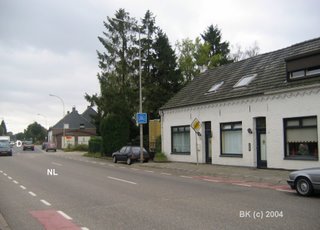To me the key principal here is that the system should not only be fair, open and transparent, it should place the absolute minimum burden on travellers to New Zealand consistent with a reasonable level of border security. That isn't just a question of being nice to travellers, it's also of economic importance.
One of the main impediments to NZ's growth is our geographical position. Tourists and business people (or "customers" in commercial terms) need to endure a minimum of three hours on a plane, and mostly much longer. We shouldn't add to this by slowing things up at the airport.
It's to be noted that our major trading partners have much quicker and more efficient border controls than we do. Generally, a scan of a passport is all that's required, even for non-EU citizens entering the EU (and "Schengen" borders within the EU, which one could reasonably regard as similar to the Australia/NZ "border", consist of a roadsign, as shown below).

The document asks the following questions:
4.1.1 Should the single term "visa" be used for all travel, entry and stay authorization granted to non-citizens?
4.1.2 Should the system continue to allow for exceptions to the standard requirement to have authorization to travel to, enter and remain in New Zealand (for example, through the equivalent of visa-free arrangements or permit exemptions)?
4.2.1 Are all the current permit exemptions justified?
I would say yes, yes and yes.
I'd go on to argue that the Act should put an obligation on NZIS to justify and minimize compliance costs and times at NZ airports. We could look at the following:
- Recording most, if not all, visas and permits electronically rather than through passport stamps and stickers.
- Removing the arrival and departure card requirements. According to this Guardian article most UK landing cards pile up unprocessed in a warehouse, and I wouldn't be surprised if this happened here as well. Almost all the information on landing cards can be (and mostly is) obtained from the airlines electronically. Having travellers sign to say that they have no contraband might be useful (but doesn't have much legal force).
- Replacing the departure counters by spot-checks and automated scrutiny of flight manifests.

No comments:
Post a Comment